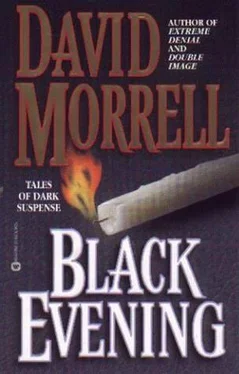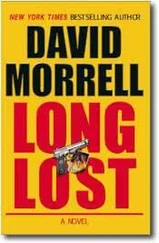David Morrell - Black Evening
Здесь есть возможность читать онлайн «David Morrell - Black Evening» весь текст электронной книги совершенно бесплатно (целиком полную версию без сокращений). В некоторых случаях можно слушать аудио, скачать через торрент в формате fb2 и присутствует краткое содержание. Жанр: Ужасы и Мистика, на английском языке. Описание произведения, (предисловие) а так же отзывы посетителей доступны на портале библиотеки ЛибКат.
- Название:Black Evening
- Автор:
- Жанр:
- Год:неизвестен
- ISBN:нет данных
- Рейтинг книги:4 / 5. Голосов: 1
-
Избранное:Добавить в избранное
- Отзывы:
-
Ваша оценка:
- 80
- 1
- 2
- 3
- 4
- 5
Black Evening: краткое содержание, описание и аннотация
Предлагаем к чтению аннотацию, описание, краткое содержание или предисловие (зависит от того, что написал сам автор книги «Black Evening»). Если вы не нашли необходимую информацию о книге — напишите в комментариях, мы постараемся отыскать её.
Black Evening — читать онлайн бесплатно полную книгу (весь текст) целиком
Ниже представлен текст книги, разбитый по страницам. Система сохранения места последней прочитанной страницы, позволяет с удобством читать онлайн бесплатно книгу «Black Evening», без необходимости каждый раз заново искать на чём Вы остановились. Поставьте закладку, и сможете в любой момент перейти на страницу, на которой закончили чтение.
Интервал:
Закладка:
"Love you, man," he said.
"… love you."
Dazed, I stumbled outside. Down the steps. Across the sand. Blinded by the sun, unable to clear my nostrils of the stench in that room, I threw up beside the car.
The next day, I drove out again. The last time. Jill went with me. He'd moved. I never learned where.
And this is how it ended, the final dregs of his career. His talent was gone, but how his determination lingered.
Movies. Immortality.
See, special effects are expensive. Studios will grasp at any means to cut the cost.
He'd told me, "Forget about our bargain." I later discovered what he meant – he worked without me in one final feature. He wasn't listed in the credits, though. Zombies from Hell . Remember how awful Bela Lugosi looked in his last exploitation movie before they buried him in his Dracula cape?
Bela looked great compared to Wes. I saw the Zombie movie in an eight-plex out in the Valley. It did great business. Jill and I almost didn't get a seat.
Jill wept as I did.
This fucking town. Nobody cares how it's done, as long as it packs them in.
The audience cheered when Wes stalked toward the leading lady.
And his jaw fell off.
In 1986, a year after the previous story was published, I made a decision that surprised me as much as it did anyone else. Since 1970, I had been teaching American literature at the University of Iowa. I had risen through the ranks, gaining tenure and a full professorship. I thoroughly enjoyed teaching. It was a delight to be around young people eager to learn. The stimulation of the university environment and of my colleague friends had been a constant in my life for sixteen years.
Then I woke up one morning and recognized that I didn't have the energy to devote myself to two full-time professions any longer. I had been working seven days a week for as long as I could remember. Balancing my teaching responsibilities with my writing needs had often required me to get up before dawn and to stay awake after my family went to sleep. The idea of a day off or of a free weekend wasn't in my universe. But while teaching was my love, writing was my passion, and when the burden of fatigue finally overwhelmed me, there wasn't any doubt what "the mild-mannered professor with the bloody-minded visions," as one critic called me, would do. In the fall of 1986, I resigned from the university.
The adjustment was painful. After all, academia had been a crucial part of my life for even longer than my years at Iowa – all the way back to 1966 when I'd entered graduate school at Penn State. Although I now had the luxury to write full time, I continued to feel the tug of the classroom. Often I reconsidered my decision. But in a matter of months, neither writing nor teaching mattered any longer.
In January of 1987, my son was diagnosed with bone cancer. From then until his death in June, the nightmarish rollercoaster of emotions and pain through which Matt suffered made me fear for my sanity. This can't be happening, I told myself. It isn't real. But despairingly it was, and I found myself wanting to escape from reality. While sitting in Mart's intensive-care room, watching his septic-shock-ravaged, comatose body, I was surprised to discover that the novel I was holding was by Stephen King. Stephen is a friend. He knew Matt and kindly sent him letters along with rock tapes to try to distract him from his ordeal. Even so, it seemed odd to me that in the midst of real-life horror, I was reading made-up horror. Then it occurred to me that the made-up horror was paradoxically providing a barrier from real-life horror. I recalled how fans often wrote to me, describing disasters in their lives – deaths, marriage breakups, lost jobs, fires, floods, car accidents – telling me that a book of mine had helped them make it through the night. As the subject of my doctoral dissertation, John Barth, once said, "Reality is a nice place to visit, but you wouldn't want to live there."
While these thoughts went through my mind, another friend, Douglas Winter, a multiple talent fiction writer/critic/anthologist/attorney asked if I would contribute to an anthology he was putting together, Prime Evil . Writing was the last thing I wanted to do, and yet, with Doug's encouragement, when I wasn't visiting Matt in the hospital, I wrote the following novella which was suggested by my fascination with the paintings of Van Gogh. A tale about insanity, it helped to keep me sane. It received the Horror Writers Association award for the best novella of 1988.
Orange Is for Anguish, Blue for Insanity
Van Dorn's work was controversial, of course. The scandal his paintings caused among Parisian artists in the late 1800s provided the stuff of legend. Disdaining conventions, thrusting beyond accepted theories, Van Dorn seized upon the essentials of the craft to which he'd devoted his soul. Color, design, and texture. With those principles in mind, he created portraits and landscapes so different, so innovative, that their subjects seemed merely an excuse for Van Dorn to put paint onto canvas. His brilliant colors, applied in passionate splotches and swirls, often so thick that they projected an eighth of an inch from the canvas in the manner of a bas-relief, so dominated the viewer's perception that the person or scene depicted seemed secondary to technique.
Impressionism, the prevailing avant-garde theory of the late 1800s, imitated the eye's tendency to perceive the edges of peripheral objects as blurs. Van Dorn went one step farther and so emphasized the lack of distinction among objects that they seemed to melt together, to merge into an interconnected, pantheistic universe of color. The branches of a Van Dorn tree became ectoplasmic tentacles, thrusting toward the sky and the grass, just as tentacles from the sky and grass thrust toward the tree, all melding into a radiant swirl. He seemed to address himself not to the illusions of light but to reality itself, or at least to his theory of it. The tree is the sky, his technique asserted. The grass is the tree, and the sky the grass. All is one.
Van Dorn's approach proved so unpopular among theorists of his time that he frequently couldn't buy a meal in exchange for a canvas upon which he'd labored for months. His frustration produced a nervous breakdown. His self-mutilation shocked and alienated such onetime friends as Cézanne and Gauguin. He died in squalor and obscurity. Not until the 1920s, thirty years after his death, were his paintings recognized for the genius they displayed. In the 1940s, his soul-tortured character became the subject of a best-selling novel, and in the 1950s a Hollywood spectacular. These days, of course, even the least of his efforts can't be purchased for less than three million dollars. Ah, art.
It started with Myers and his meeting with Professor Stuyvesant. "He agreed… reluctantly."
"I'm surprised he agreed at all," I said. "Stuyvesant hates Postimpressionism and Van Dorn in particular. Why didn't you ask someone easy, like Old Man Bradford?"
"Because Bradford 's academic reputation sucks. I can't see writing a dissertation if it won't be published, and a respected dissertation director can make an editor pay attention. Besides, if I can convince Stuyvesant, I can convince anyone."
"Convince him of what?"
"That's what Stuyvesant wanted to know," Myers said.
I remember that moment vividly, the way Myers straightened his lanky body, pushed his glasses close to his eyes, and frowned so hard that his curly red hair scrunched forward on his brow.
"Stuyvesant said that, even disallowing his own disinclination toward Van Dorn – God, the way that pompous asshole talks – he couldn't understand why I'd want to spend a year of my life writing about an artist who'd been the subject of countless books and articles. Why not choose an obscure but promising Neo-Expressionist and gamble that my reputation would rise with his? Naturally the artist he recommended was one of Stuyvesant's favorites."
Читать дальшеИнтервал:
Закладка:
Похожие книги на «Black Evening»
Представляем Вашему вниманию похожие книги на «Black Evening» списком для выбора. Мы отобрали схожую по названию и смыслу литературу в надежде предоставить читателям больше вариантов отыскать новые, интересные, ещё непрочитанные произведения.
Обсуждение, отзывы о книге «Black Evening» и просто собственные мнения читателей. Оставьте ваши комментарии, напишите, что Вы думаете о произведении, его смысле или главных героях. Укажите что конкретно понравилось, а что нет, и почему Вы так считаете.












